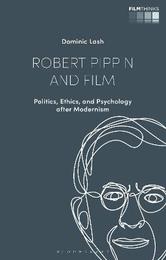
|
Robert Pippin and Film: Politics, Ethics, and Psychology after Modernism
Hardback
Main Details
| Title |
Robert Pippin and Film: Politics, Ethics, and Psychology after Modernism
|
| Authors and Contributors |
By (author) Dr Dominic Lash
|
| Series | Film Thinks |
|---|
| Physical Properties |
| Format:Hardback | | Pages:280 | | Dimensions(mm): Height 216,Width 138 |
|
| Category/Genre | Film theory and criticism
Western philosophy from c 1900 to now
Philosophy - aesthetics |
|---|
| ISBN/Barcode |
9781350182899
|
| Classifications | Dewey:791.4301 |
|---|
| Audience | | Tertiary Education (US: College) | |
|---|
| Illustrations |
22 bw illus
|
|
Publishing Details |
| Publisher |
Bloomsbury Publishing PLC
|
| Imprint |
Bloomsbury Academic
|
| Publication Date |
10 February 2022 |
| Publication Country |
United Kingdom
|
Description
Robert Pippin (1948- ) is a major figure in contemporary philosophy, having published influential work on thinkers including Kant, Hegel, and Nietzsche. He is also an original thinker about - and critic of - film who has written books and numerous articles on canonical subjects such as the Western, Film Noir, and Hitchcock's Vertigo. In Robert Pippin and Film, Dominic Lash demonstrates the ways that film has been crucial to Pippin's thought on important philosophical topics such as political psychology, ethics, and self-knowledge. He also explores the implications of Pippin's methodological commitments to clear language and to maintaining close contact with the details of the films in question. In so doing, Lash brings Pippin's work on film to a wider audience and contributes to current debates both within film studies and beyond. This includes those concerning the relationships between film and philosophy, criticism and aesthetics, and individual subjectivity and political consciousness. Lash focuses on Pippin's major works on film - Hollywood Westerns and American Myth (2010), Fatalism in American Film Noir (2012), The Philosophical Hitchcock (2017), and Filmed Thought (2020) as well as his many shorter writings on film.
Author Biography
Dominic Lash is Associate Teacher in the Department of Film at the University of Bristol, UK. He is the author of The Cinema of Disorientation: Inviting Confusions (2020) and his work has been published in journals such as Screen, Cinergie and Movie.
ReviewsThe work of Robert Pippin is fast becoming an indispensable reference in studies of film and philosophy. Dominic Lash provides a clear, accessible exegesis of Pippin's ideas and examples, while also extending the discussion and offering a comparative assessment of Pippin's place in the contemporary critical scene. -- Adrian Martin, Monash University, Australia Full of keen insights and subtle analysis, Lash expertly elucidates Pippin's unique contribution to film criticism and theory from the perspective of a leading contemporary philosopher. Just as significantly, through the prism of Pippin's deep reflections, Lash provides his own distinctive and illuminating 21st century take on the ethical and socio-political dimensions of a range of films, modes, genres, and styles. -- Daniel Yacavone, University of Edinburgh, UK Robert Pippin's potential contribution to film philosophy and criticism has for too long gone undervalued and underexamined. This pathbreaking book corrects this oversight. Eminently readable, written in elegant prose that explains complex philosophical concepts with verve and lucidity, Robert Pippin and film is a must for newcomers to Pippin's writing on film. Lash's own brilliant, versatile readings of films from the Hollywood Western to European arthouse confirm the importance of taking Pippin's work, in the author's own words, as "a spur to further inquiry". -- Catherine Wheatley, King's College London, UK In Robert Pippin and Film, Dominic Lash provides provides a welcome and astute account of this philosopher and critic of cinema. Moving adroitly between careful analyses of the films Pippin discusses and the broader philosophical project that underlies his method, Lash not only shows why Pippin matters for film studies but continues the project to show how it can have new and greater relevance. This is a book that is more than a study of a philosopher of film; it is itself a compelling story about how philosophy and film might go together. -- Daniel Morgan, University of Chicago, USA
|